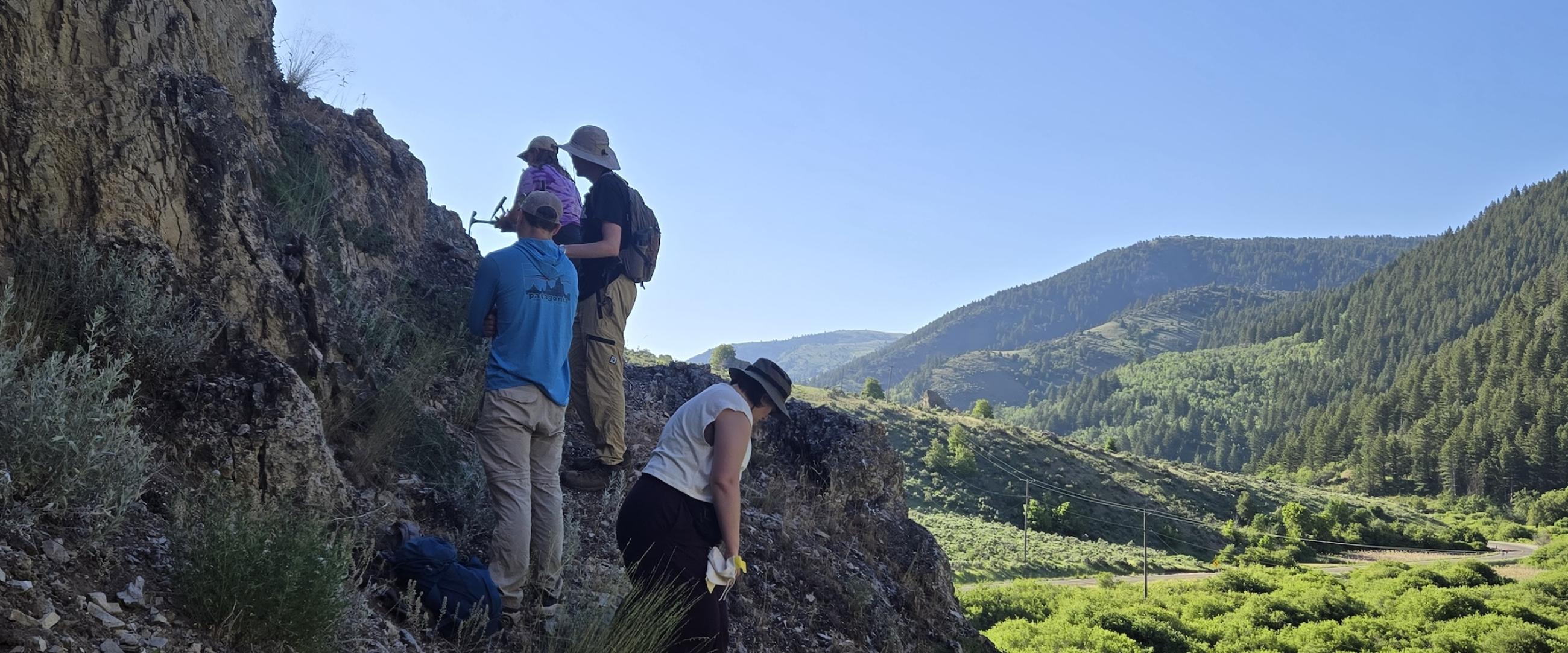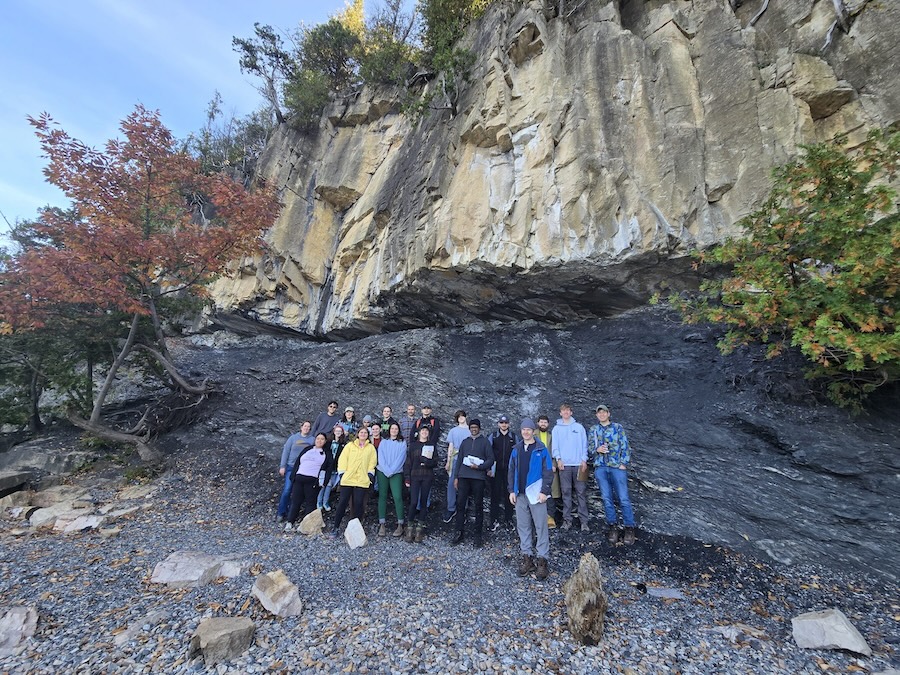Earth Science is concerned with the evolution of life, planetary interiors, the causes of earthquakes and volcanic eruptions, oceanic and atmospheric phenomena, and Earth's surface processes. Student-centered learning grounded in hands-on field and laboratory-based instruction constitutes Southern’s Earth Science program, which has a more than 50-year tradition of producing first-rate geoscientists with expertise in geology, meteorology, oceanography, astronomy, and environmental earth science.
Program Features
- Specialized concentrations that give students the ability to pursue an education that matches their interests
- Hands-on learning in the classroom, laboratory, and in a field setting
- Individualized research opportunities working directly with faculty
- Strong sense of community among students, faculty, and alumni
- Networking opportunities and connections to alumni working in industry
- A degree in Earth Science opens the door to multiple career pathways in industry, graduate school, or working for state or federal agencies
- Exposure to the Earth Science professional community through conferences and other professional organizations
- Opportunities for internships for credit or as summer positions in industry
Learning Outcomes
- Obtain a broad knowledge of Earth Science and its subdisciplines (Geology, Environmental Science, Meteorology, Oceanography, Astronomy)
- Understand and be able to demonstrate the scientific method
- Demonstrate scientific reasoning -- cause to effect, multiple causes and cause sequences possible, quantitative and/or qualitative reasoning, critical thinking/reasoning skill
- Demonstrate information literacy -- search for scientific data or information, discern reliable from non-reliable sources, source attribution, reliable and accurate reporting
- Demonstrate proficiency in communication -- oral, written and technological
- Synthesize ideas -- interrelationship of sub-disciplines of earth sciences, interdisciplinary thinking
- Exhibit professionalism -- ethics, integrity, meeting deadlines, work ethic, etc.
- Demonstrate computer and technological adeptness
- Assess and evaluate scientific and environmental situations
- Develop an appreciation and responsibility for the natural world
Earth Science, B.A.
The Bachelor of Arts in Earth Science provides a broad-based background in the fundamentals of Earth Sciences. It offers maximum flexibility in course selection to enhance interdisciplinary study and makes a double major easily accessible to students in related fields.
Earth Science, B.S. - General
This concentration is for students who wish to pursue rigorous scientific curricula and have broad interests in the earth sciences, including geology, meteorology, oceanography, and astronomy.
Earth Science, B.S. - Environmental Science
This Environmental Science concentration prepares students for careers in the environmental and geotechnical fields and graduate-level study in the earth and environmental sciences. In addition to foundational courses in geology, meteorology, oceanography, and physical science, the program includes additional coursework in the life sciences and public health.
Earth Science, B.S. - Geology
The Geology concentration is designed for students who are interested in the study of the solid earth and intend to seek careers as professional geologists. The concentration prepares students for careers in geotechnical industries (energy, mining, agriculture, engineering, government agencies) and graduate-level study in geology and other related fields.
Earth Science, B.S. - Natural Hazards
The Natural Hazards concentration is designed to provide students with a fundamental background in the underlying science of natural hazards (hurricanes, tornadoes, floods, drought, earthquakes, tsunamis, landslides, volcanic eruptions, asteroid impacts, wildfires, and climate change) along with electives in Public Health and Forensics that address elements of the human consequences and response to these natural disasters. The offering is designed for students who are interested in working for governmental (local, state, and federal) and non-governmental organizations (NGOs) that help mitigate and provide relief for natural disasters.
Earth Science, B.S. - Natural Resources
The Natural Resources concentration provides students with a fundamental background in basic sciences, including both the life and physical sciences. The offering is designed for students who are interested in the study of soil, water, weather/climate, watersheds, and mineral and energy resources that are frequently linked to agriculture/horticulture, forestry, ecology, and wildlife management. These areas of interest frequently transcend traditional boundaries between the life and physical sciences. The Natural Resources concentration allows students to be awarded a Biology minor as an integral part of the Earth Science degree program.
Earth Science, B.S. - Secondary Education
This program is intended for students who are interested in becoming middle and high school earth science and general science teachers. The curriculum involves core science content in general science, geology, meteorology, oceanography, astronomy, and environmental earth science, as well as content related specifically to the teaching professions.
Careers
Earth Science's strong STEM-based curricula, including foundational coursework in math, physics, chemistry, and biology provides our graduates with the skills and adaptability for a constantly changing world. Talented earth scientists are in high demand and job prospects are expected to grow significantly in the future. Demand is driven by society's continued need for environmental problem solving, natural-hazard mitigation, responsible exploration and extraction of energy and natural materials, and stewardship of land and natural resources. There are a number of career opportunities across a broad spectrum of private sector industries, non-profit organizations, government agencies, and academia.
- Environmental Consulting
- Natural Resource Development, Management, and Planning
- Natural Hazard Assessment and Mitigation
- Hydrology and Water Resource Monitoring
- Geotechnical Engineering
- Soil Conservation and Management
- Science Education (K-12 and College)
- Science Outreach and Communication
- Fundamental Scientific Research in Geology and Earth Sciences, Environmental Science, Astronomy and Planetary Science
- Oceanography and Marine Science
- Mining, Mineral, and Energy Resource Exploration
- Environmental Regulation and Enforcement
- Climate Science
- Meteorology
- Paleontology
- Graduate Studies
Typical Job Titles
- Geologist
- Environmental Consultant
- Geoscientist
- Hydrologist
- Science Teacher
- Soil Scientist
- Science Writer/Communication Specialist
- Project Geologist
- Field/Quality Control Engineer
- Health and Environmental Safety Consultant/Officer
- Research Scientist
- Emergency Response Technician
- Gemologist
- Seismic Consultant
- Land Surveyor
- Exploration Geologist
- Geochemist
- Environmental Emergency Planner
- Environmental Data Analyst
- Environmental/Geotechnical Field Technician
- Microscopist
- Materials Scientist
Accreditation
The Earth Science, B.S. - Secondary Education program is accredited by The Council for the Accreditation of Educator Preparation (CAEP) through the SCSU College of Education.
Hands-On Learning Through Fieldwork
Small classroom sizes are conducive to both effective instruction and opportunities to participate in cutting-edge research. We take advantage of the diverse local geology and landscapes with frequent field excursions. We have an active student club that engages with the campus community.
Read Story: Studying Ancient Geology in Vermont’s Champlain Valley


